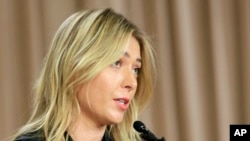U.S-based sportswear maker Nike says it is suspending its sponsorship of Maria Sharapova, after the Russian tennis star acknowledged failing a drug test.
Nike said it "saddened and surprised" by the news. Two other major sponsors, Swiss watchmaker Tag Heuer and German carmaker Porsche, also suspended ties with the tennis star.
Sharapova on Monday said she tested positive for the drug, meldonium, at the Australian Open in January. She said she has been taking the drug for 10 years for health reasons and that it was only added to the list of banned substances by the World Anti-Doping Agency (WADA) at the start of this year.
Sharapova said she did not look at an e-mail with the updated ban list before taking her medication.
Punishment looming
Because of the violation, the 28-year-old five-time Grand Slam champion is facing a provisional suspension by the International Tennis Federation, which could prevent her from competing for her native country in the upcoming Rio Olympics.
Steve Simon, the head of the Women's Tennis Association, issued a statement calling Sharapova "a woman of great integrity," but said "it is every player's responsibility to know what they put in their body and to know if it is permissible."
Sharapova has won 35 WTA singles titles since winning Wimbledon as 17-year-old teenage sensation in 2004, and an earned $36 million during that time, largely from endorsements.
"I made a huge mistake. I let my fans down and I let the sport down. I have been playing since the age of four a sport that I love so deeply," Sharapova said.
Sharapova's career has been marred by numerous injuries which have kept her off the tour for long stretches of time. She has not competed since she lost to world No. 1 American Serena Williams in the quarter-finals of the Australian Open in January 25.
Meldonium facts
Meldonium - also known as mildronate -- is manufactured in Latvia and used to treat diabetes, heart disease, and low magnesium, but some researchers have linked it to increased athletic performance if taken in large doses. It is not approved in the United States but is available in Russia and former Soviet Union countries.
"I was first given the substance back in 2006. I had several health issues going on at the time," said Sharapova. "I was getting sick very often and I had a deficiency in magnesium and a family history of diabetes, and there were signs of diabetes."
Sharapova said she did not know what the penalty would be for ingesting the now-banned drug.
"I know that with this I face consequences and I don't want to end my career this way. I really hope that I will be given another chance to play this game," she said.
WADA president Craig Reedie told The Associated Press that any athlete testing positive for meldonium would normally face a one-year suspension.
Several athletes in various sports have already tested positive for meldonium, including Russian figure skater Ekaterina Bobrova, who also revealed the news on Monday.










